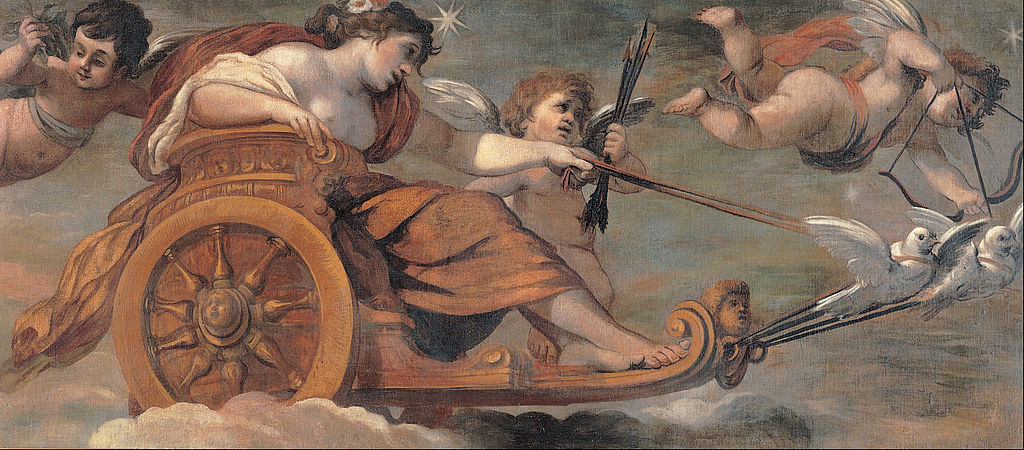Unit 5: Love and Metamorphosis

The Legend of the Anemone
Adapted from Classic Myths Retold by Mary Catherine Judd, $\ccpd$
“Just see the basket full of anemones we picked down in the field! They were as thick there as they could be. We picked and picked, and it didn’t seem to make a bit of difference, there were so many left. Aren’t they lovely?”
“That makes me think, Charlie, of a myth there is about the first anemones.”
“A myth? What is that, mother?”
“Oh, I know, John,” said Charlie. “It is one of those stories that people used to believe just as we used to believe in Santa Claus. He’s a myth, you know, and now you please keep still and maybe mother has time to tell us about the first anemones. I like myths.”
“This is a hunting story, so I know you will like it, boys. But just think of hunting with a bow and arrows and spears! Would you like that?”
“Yes, yes!” shouted both boys.
“Well, years ago in the Golden Age when the world was young there lived a Greek hunter whose name was Adonis. He was tall and handsome. His friends thought it a great pity that he spent all his time in the woods, with only his dogs for company. Away he would go day after day with his arrows at his back and his spear at his side. His dogs were fierce and would attack any creature. His horse was as brave as he. His friends begged him to wait until he was older and stronger before he went into the deep forests, but he never waited. He had killed bears, wolves, and lions. Why should he wait?

“But the wild hog is fiercer than the tiger. One spring morning while hunting in the forest, Adonis wounded two. Leaving his dogs to distract one while he killed the other, he got off his horse, and, running, threw his spear at the hog. Its thick skin was tough, and the spear fell to the ground. He pulled out an arrow, but before he could place it in the bow, the ugly beast had caught him with its sharp tusks.
“He pulled the tusks out of his side and, bleeding at every step, staggered down a hillside toward a pond to wash his wounds. But the cruel beast reached it as soon as he did. A flock of white swans that had been drinking from the pond, rose on their strong wings and, flying straight to their mistress, Venus, told the story of what they had just witnessed.
“Back they brought her in her silver chariot, sailing so steadily that, from the silver cup of nectar she brought with her, not a drop was spilled.
“’Adonis! Adonis!’ cried Venus.
“There was nothing but drops of blood on the grass to tell her where he had been. It was all that was left of the handsome hunter.

“Venus sprinkled some of the nectar on these drops of blood and, in an hour, tiny flower buds showed their heads. Then she drove sadly home. Soft winds blew the tiny buds open, and at night blew them away. So people called them wind-flowers, or anemones. And they believe that the pink and purple which colored them came from the heart of Adonis.”
“But why didn’t tiger-lilies or some other big and showy flowers come, not these pretty little things?”
“I don’t know, John; go and ask Venus.”
 |
 |
Comprehension Questions
Answer the following questions according to the reading.
- Describe Adonis.
- What happens to Adonis?
- What does he become at the end of the story, and how?
- Why is the mother telling this story?
Critical Thinking and Vocabulary Questions
Answer the following questions. Compare your answers with a partner.
- Why do you think Venus did what she did?
- What natural phenomenon is this story trying to explain?
- What is different about the way this story is told from previous stories from this textbook?
- We get the word “Adonis” from this story. Read the definition below from Merriam-Webster.
Adonis, like Narcissus, was a beautiful youth in Greek mythology. He was loved by both Aphrodite, goddess of love and beauty, and Persephone, goddess of the underworld. One day while hunting, he was killed by a wild boar. In answer to Aphrodite’s pleas, Zeus allowed him to spend half the year with her and half in the underworld. Today a man called an Adonis probably has strikingly fine features, low body fat, rippling muscles—and a certain vain attitude of overconfidence. Adonises should beware; the boar that killed Adonis was sent by either the jealous Artemis (goddess of hunting) or the envious Ares (god of war).
- Who in your opinion would be considered an Adonis?
CEFR Level: CEF Level B2
